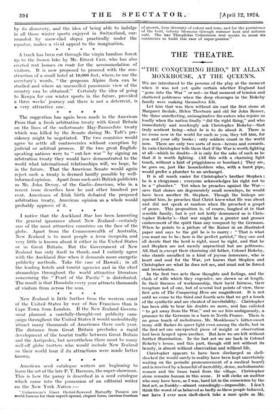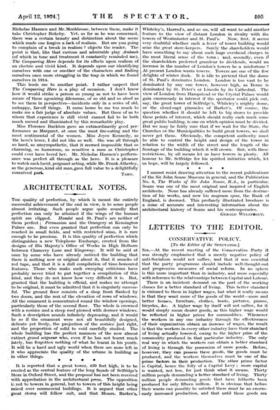THE THEATRE.
"THE CONQUERING HERO," BY ALLAN MONKHOUSE, AT THE QUEEN'S.
WE are introduced to the persons of the play at the moment when it was not yet quite certain whether England had "gone into the War " or not—in that moment of tension and shattered politeness when the deep cleavages in the Rokeby, family were making themselves felt.
Let him that was then without sin cast the first stone at Margaret Ircdale, Helen Thorburn and old Sir John Romer,
the three unreflecting, unimaginative fire-eaters who rejoice so loudly when the nation finally " did the right thing," and who immediately and mockingly ask Christopher Rokeby—that truly sentient being—what he is to do about it. There is no room now in the world for such as you, they tell him, for you and your silly books ; only aoldieks" count in the world now. There are only two sorts of men—heroes and cowards. In vain Christopher tells them that if the War is worth fighting at all—which he doubts—it is only for the sake of such as he that it is worth fighting. (All this with a charming light touch, without a hint of priggishness or bombast.) They are, he goes on, just like householders who, with a burst pipe, would prefer a plumber to an archangel.
It is all much easier for. Christopher's brother Stephen ; he is a clergyman : everyone acknowledges his right not to be a " plumber." Yet when he preaches against the War— save that stones are degenerately small nowadays, he would have been another St. Stephen. Though the bishops are against him, he preaches that Christ knew what He was about and did not speak at random when He preached a gospel of peace. This proposition is, of course, laughed at in that sensible family, but is yet not hotly denounced as is Chris- topher Rokeby's—that war might be a greater and grosser enslavement of the spirit than any conquest by the Germans. When he points to a picture of the Kaiser in an illustrated paper and says to the girl he is to marry : " That is what you want me to be ; here is the perfect patriot," they one and all decide that the herd is right, must be right, and that he and Stephen are not merely unpractical but are poltroons. All, that is, except their charming old father, Colonel Rokeby, who stands unsullied• in a kind of joyous innocence, who is heart and soul for the War, yet knows that Stephen and Christopher see what he does not see, and must not be forced and browbeaten.
In the first two acts these thoughts and feelings, and the clash of wills which they engender, are shown us at length. In their fineness of workmanship, their lucid fairness, their recapture not of one, but of several lost points of view, these first acts of The Conquering Hero are magnificent. It is not until we come to the third and fourth acts that we get a touch of the synthetic and are cheated of inevitability. Christopher has been able to bear his doubts no more, and has enlisted " to get away from the War," and we see him ambiguously, a prisoner to the Germans in a barn in North France. There is no gross touch of melodrama, Mr. Monkhouse's bitter-sweet irony still flashes its queer light even among the shells, but in the first act one unexpected piece of insight or observation had been heaped upon another. But here we are left without further illumination. In the last act we are back in Colonel Rokeby's house, and this part, though still not without its beauty, is almost without observation and without life.
Christopher appears to have been discharged as shell- shocked (he would surely in reality have been kept uncertainly waiting on the periodic pronouncement of a medical board) and is received by a houseful of incredibly, dense, melodramatic women and the brass band from the village. Christopher alone remains human in this scene. It will strike an auditor who may have been, as I was, hard hit in the conscience by the first act, as frankly—almost consolingly-Ampossihle. I don't. think the worst of us behaved as badly as-these people behaved, nor have I ever seen shell-shock take a man quite as. Mr. Nicholas Hannen and Mr.Monkhouse, between them, make it take Christopher Rokeby. Yet, as far as he was concerned, there was a certain beauty and distinction about the scene which made one forgive a lack of realism. But are you going to complain of a break in realism ? objects the reader. The point is that, like that curious and admirable play Ambush (of which in tone and treatment it constantly reminded me), The Conquering Hero depends for its effects upon realism of an electric and vivid kind. It depends upon our identifying ourselves with-one 'or another of the characters and finding ourselves once more struggling in the trap in which we found ourselves in 1914.
This leads me to another point. I rather suspect that The Conquering Hero is a play of occasion. I don't know how it would strike a person so young as not to have been aware of these agonizing dilemmas, a so old and so aloof as to see them in perspective—incidents only in a series of old, unhappy, far-off things. It came home to me too much to make me a fair judge of absolute values. But those of us to whom that experience is still vivid cannot fail to be both much moved and illuminated by this remarkable play.
Miss Florence Buckton gave an extraordinarily good per- formance as Margaret, at once the most fire-eating and the most sentimental of the women. Miss Joyce Kennedy, as the hero's lover, I did not like so well. She was all through so hard, so unsympathetic, that it seemed impossible that so charming, so humorous, so sensitive a man as Christopher could ever have loved her. Mr. Nicholas Hannen's perform- ance was perfect all through as the hero. It is a pleasure to watch such lucid, poignant acting, while Mr. Frank Atherley, as the generous, kind old man, gave full value to a delightfully











































 Previous page
Previous page